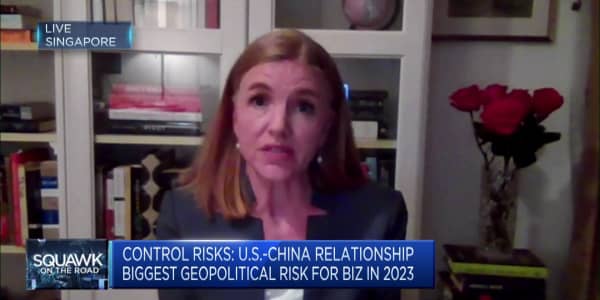The end is in sight for the global economic crisis. Fears surrounding the euro zone have calmed. In Japan, Prime Minister Shinzo Abe's "three arrows" - the key tenets to his economic recovery plan - are starting to hit home. China is slowly introducing key reforms and the Federal Reserve judged the U.S. economy strong enough to start scaling back its bond purchases.
However, in the world of geopolitics, things were not quite so rosy. Tensions in the Middle-East, North Korea, Russia and the NSA spying scandal all raised concerns.
So what should you watch out for in 2014? Here is a list of the year's top risks.
By CNBC's Alice Tidey.
Russia
"Look for brash geopolitical behavior from Russia in 2014," risk consultancy Eurasia warned recently. President Vladimir Putin may be the "single most powerful individual in the world", and his growing domestic unpopularity is prompting an erratic governing style.
U.K.- based global analysis firm Oxford Analytica says 2014 could see "the collapse of the Putin system", with a disintegration of the fine balance he has maintained among the ruling elite.
Middle East
Tensions in the Middle East remain elevated and the region, and according to Eurasia, have yet to reach bottom. The crisis in Syria looks far from resolved and Afghanistan still ranks high on Oxford Analytica's worry-list for the year. Failure to resolve conflict with the Taliban could engender a "regionally destabilizing political vacuum" post-2014, it warns.
Equally troublesome is the rise of Al Qaeda and other jihadist ideologies, warn both Eurasia and Oxford Analytica.
China
Economists polled by Reuters expect annual GDP growth to slow to 7.6 percent in the fourth quarter, putting 2013 growth on track for the weakest showing in 14 years.
Too rapid a deceleration could derail the economy and "fracture China politically," Oxford Analytica warns.
Furthermore, the government's reform spree has added "much more uncertainty within China – and more potential for upside and downside", argues Eurasia.
Iran
After years of failed negotiations for a nuclear deal, Iran and the P5 1 achieved a breakthrough in November 2013 by reaching an interim agreement. The terms of the deal which come into force on January 20 2014 include the total dilution of Iran's 20 percent-enriched uranium stock within six months as well as daily access to uranium enrichment sites. In return, the Middle Eastern nation will be granted "limited, temporary" and "reversible" sanctions relief.
However, Eurasia puts the likelihood of a longer-term deal at 60 percent, and highlights that a deal itself would create some risks, including for oil prices. But failure to reach an agreement could mean that the Iranian "balance of power" could shift from the moderate President Hassan Rouhani to hardliners and enhance the "greater threat of Israeli and/or U.S. military strikes."
Additionally, the rivalry between Iran and Saudi Arabia could intensify, "sparking a full-scale 'proxy war' between the region's two major powers," warns Oxford Analytica.
Europe
Although there is light at the end of the tunnel, Europe still faces tough challenges, not least in achieving better integration as new member states join. Unemployment is still worryingly high and businesses and families still seem reluctant to spend their way out of the doldrums, but the group of countries that use the single currency no longer appears on the brink of the abyss.
Eurasia places Europe in the "muddled middle" – neither recovery nor collapse – and argues that the European Central Bank's efforts to revive the economy are paying off. While anti-European parties are gaining traction, it would be "virtually impossible for them to pool their political weight," the consultancy argued.
North Korea
Risks of volatility in the Korean peninsula have increased since the death of the Kim Jong-il in December 2011, says Oxford Analytica, adding that the acclamation of his son, Kim Jong-un, as great successor is "a façade".
While not in Eurasia's top 10 risks for 2014, the political risk consultancy points out that the execution of the country's second-most powerful man "has no precedent" and raises the risk of heightened instability domestically and aggression abroad.
Petrostates
Oil-producing countries around the world will be closely watching Iran's nuclear negotiations. Eurasia, as a deal "would almost certainly cause a selloff in an already increasingly bearish market."
This would imply that these nations, already in "difficult economic shape" due to "mismanaged economies" could face "serious budgetary squeezes." The consultancy group estimates that Russia and Venezuela would be the most vulnerable in this scenario.
United States
The "notable decline" in U.S. foreign policy is a major risk for Eurasia. Some previously close allies such as Germany and France seem less likely to align themselves closely with the superpower, possibly creating a "more hostile" regulatory environment for businesses.
But the reduced U.S. involvement in international affairs could also lead to weaker internationals standards, greater disunity in financial regulations and a weaker NATO.
Finally, if the U.S. economy became mired in a deflationary trap, it would "almost certainly" tip the world into another global recession, warns Oxford Analytica.





